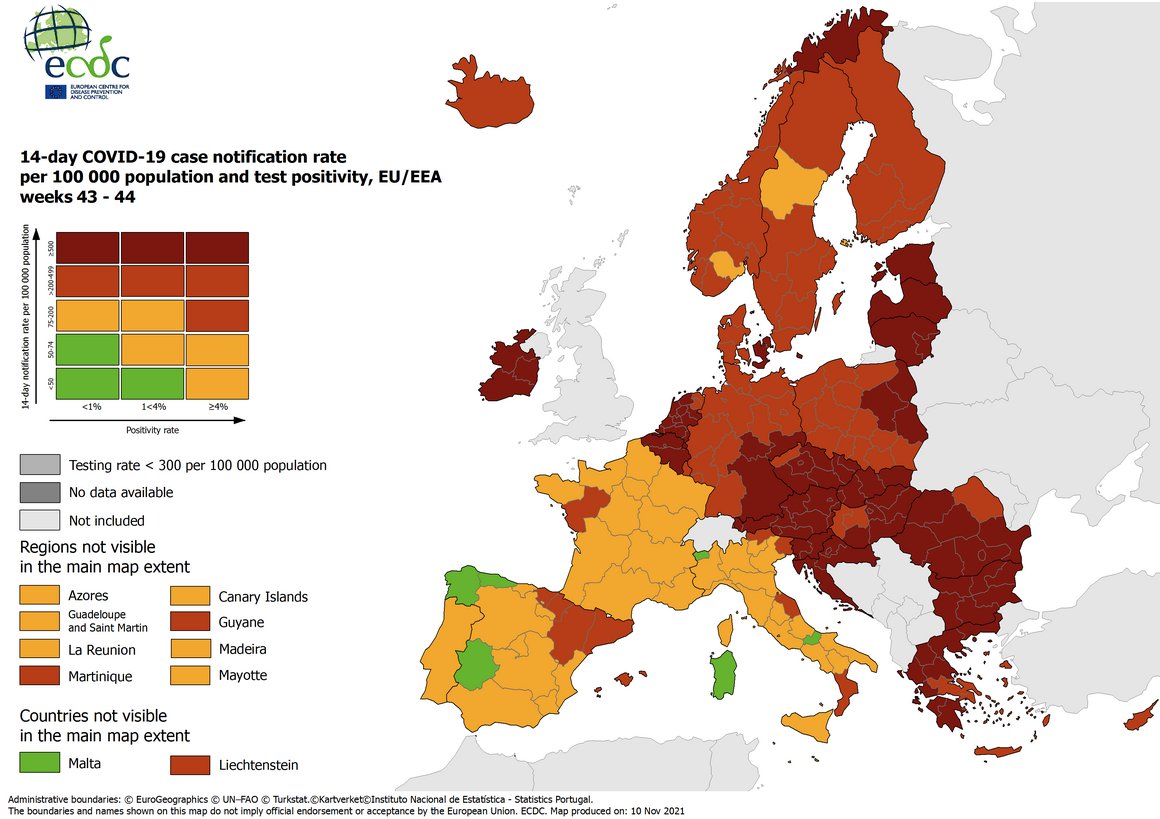Due to the increase in the number of infections, covid passports have been introduced in Bulgaria, and in Slovakia they will be applied to employees and clients in areas with the worst epidemic situation. In Berlin and Bavaria, it will not be possible for test takers to enter restaurants and cinemas, but only for vaccinated or cured people.
In Denmark, on Friday, in particular, the obligation to provide certificates of vaccination against COVID-19 in restaurants and premises where there are more than 200 people or places for 2 thousand.
Norway has reintroduced quarantine for unvaccinated people from Poland. In some cities, such as Tromsø in the north, there are local restrictions until mid-November: the need for masks on public transport, a distance of one meter and limited restaurant hours.
In Finland, as society approaches the threshold of collective immunity (now about 80% of the population has received two doses of the vaccine), most epidemic restrictions have been lifted in early October. The current recommendation to wear masks in public places (no warrants have been issued since the beginning of the pandemic) has been changed to the use of masks “at one’s own discretion”.
In Estonia, with a population of 1.3 million, the epidemic situation is now more serious and, as in other Baltic countries, one of the worst in Europe. Due to the burden on health care and the slow progress of vaccination, the government has recently decided that a negative coronavirus test result will not be a pass to some public places and facilities (such as cultural, entertainment, restaurants, bars and cafes).
These places – at least in early January – are only available to vaccinated people. At the end of October, the obligation to wear masks was restored in most public places. After the end of the so-called autumn school holidays, some local governments (for example, the capital Tallinn) decided to transfer schools (grades 4-8) to distance learning for a short time. Today, the testing system is almost universal in schools. Students take the test at home (alone or under adult supervision) and must present their results three times a week.
Pandemic control in Bulgaria, the Czech Republic and Slovakia
In Bulgaria, in mid-October, the obligation to conduct so-called green passports, ie certificates confirming vaccination, infection or a negative test for antigen or PCR. Certificates, which are also given to people with high levels of antibodies, entitle them to visit a number of public facilities – restaurants, shopping malls, gyms and cinemas. They should belong to both staff and clients, and apply to school and medical staff. In almost two-thirds of the country’s schools, students study remotely, and from the middle of the week, students in grades 1 to 4 are allowed to study full-time after testing twice a week. If parents do not agree to the test, children study remotely.
In the Czech Republic, from November 1, the validity of antigen tests was reduced to 1 day, and the validity of PCR – up to 72 hours. Tests funded by health insurance funds will be performed only on the instructions of a doctor or hygiene services and persons under 18 years of age or persons who have received the first dose of vaccination. The obligation to check vaccination certificates by the staff of restaurants, cafes and bars has also been introduced. In practice, a person without a certificate should not be served, but it is already known that some restaurant owners will not comply with the provisions and risk high fines.
On Friday, the Slovak parliament passed a draft of amendments to allow the introduction of covid certificates in the workplace, indicating vaccination, infection or a negative test result. If the employee does not have certificates and does not want to take tests, the employer is obliged to provide them, and the refusal will mean unpaid leave. The rules provide for the verification of certificates, including their authenticity, by the owners of service companies and restaurants, bars, clubs and hotels, otherwise the premises may be closed for 30 days. Authorities have previously said the new rules will apply in districts with the worst epidemic situation, where service facilities, restaurants and hotels will be open only to vaccinated people.
What are the cases in Western Europe?
Due to the large number of coronavirus infections in Berlin from Monday and in Bavaria from next Tuesday, the 2G rule will apply (vaccination and recovery). Access to restaurants, cinemas or sports facilities will be impossible for people with negative test results. Due to the sharp increase in infections across the country, free tests for SARS-CoV-2 have also been reintroduced.
In France, it was announced that from mid-December, a health passport for people over the age of 65 would be exposed to a booster dose of COVID-19.

